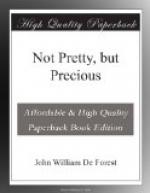“Who I was” she said, defiantly. “I will deny it no longer: I am Rose Sherbrooke, once known as Rose Coral, and, what is more to the purpose, I am the wife of Clement Rutherford. Have a care, my brother Horace, lest you reveal to the world that your immaculate relatives have been touching pitch of the blackest hue and greatest tenacity. Prove me to be the vilest of my sex, I remain none the less a wedded wife—your brother’s wife—and I defy you. The game is played out, and I have won it.”
She threw herself back in her chair and cast on him a glance of insolent disdain. Horace Rutherford looked at her with a scornful smile.
“The game is not played out,” he said, calmly. “One card remains in my hand, and I produce it. It is the Ace of Diamonds, and its title is The Rose of the Morning.”
A livid paleness overspread Mrs. Rutherford’s features, and a stifled cry escaped from her lips. She half rose from her seat, but, seeming to recollect herself, she sank back and covered her face with her hands. Horace continued, after a momentary pause:
“My investigations into the history of the Count Wilhelm von Erlenstein during the last years of his life revealed the fact that he had lost the most valuable of the jewels of his family. It had been stolen. It was a pink diamond of great size and beauty, known to gem-connoisseurs by the name of The Rose of the Morning—one of those remarkable stones which have a history and a pedigree, and which are as well known by reputation to diamond-fanciers as are Raphael’s Transfiguration and the Apollo Belvidere to the lovers of art. This gem was worn by Count Wilhelm as a clasp to the plume in his toque at a fancy ball given by one of the Metternich family, at which he appeared in the costume of Henri III. of France. He afterward, with culpable carelessness, placed it, amongst his studs, pins, watch-chains and other similar bijouterie, in a small steel cabinet which stood in his bed-chamber. His illness and the dismissal of Rose Coral occurred soon after the fancy ball in question, and it was not till his heir, the present count, had been for some time in possession of the estates that it was discovered that the great diamond was missing. It was not to be found, and suspicion immediately fell upon the late count’s valet, a Frenchman named Antoine Lasalle; who was found to have been mysteriously possessed of a large sum of money after the count’s death. He was arrested, and it was conclusively proved that he had stolen a number of valuable trinkets from his dying master, but still no trace of The Rose of the Morning could be discovered, and Lasalle strenuously denied all knowledge respecting it. The family offered large rewards for its recovery, and the detectives of all the large cities of Europe have been for some time on the alert to discover it, but in vain. As soon as I heard this story, I thought that I could make a tolerably shrewd guess as to the whereabouts of




